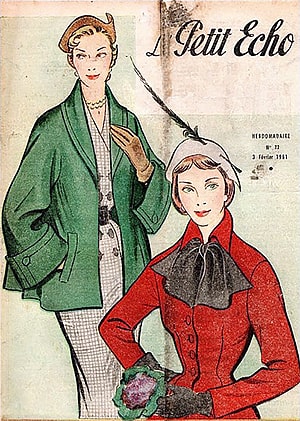L'Petit Écho
 The 3 February 1961 issue of L'Petit Écho | |
| Editor | Meli Sivren |
|---|---|
| Categories | General interest |
| Frequency | Weekly |
| Total circulation (2020) | 7,5 million |
| Founder | Eugénie and Marc Vermersch |
| First issue | 9 September 1960 |
| Company | L'Petit Collectif SCo |
| Country | |
| Based in | Maveás, Tomes |
| Language | French |
| Website | http://www.lpetitécho.gls/ |
L'Petit Écho (French reformed for "The Little Echo"; Gylic transcription: Lypeti Eko) is a Gylian general interest magazine, founded in 1960.
It publishes journalism, commentary, fiction, satire, poetry, and essays covering many topics, ranging from daily life and clothing to popular culture and politics. It is famed for its gauchic illustrations, writing style, and worldview, shaped by demopolitanism and francité.
It considers Silhouette its "sister magazine" (magazine-sœur).
History
L'Petit Écho was founded by siblings Eugénie Vermersch (Gylic transcription: Eujeni Vermeryş; born 1946) and Marc Vermersch (Gylic transcription: Maryk Vermeryş; born 1944). They were of Shalumite Dutch descent, and envisioned a cultural and humour magazine that would reflect the emerging Gylian ethos of socialised luxury.
Initially, it was named L'Petit Écho d'Monde. The name was shortened on the masthead, but "d'Monde" was retained as a tagline inside the magazine.
The first issue was published on 9 September 1960. Its sophisticated presentation and worldly content quickly made it a local, then national success. It captured the zeitgeist of the Golden Revolution and Groovy Gylias, and became one of Gylias' most successful magazines. Its distribution figures surpassed 2 million in 1964.
The success of L'Petit Écho encouraged the appearance of similar magazines. The most notable of these were Silhouette, which L'Petit Écho embraced as a "sister magazine", and The Travelling Companion. Sima Daián commented that these three magazines altogether best captured the ideal of aristerokratia, serving as an inclusive and egalitarian equivalent of a café society or jet set for ordinary Gylians.
The magazine also grew closely associated to the Tessai, a group of prominent and influential women that shaped Maveás' image in Gylias.
The wretched decade affected L'Petit Écho: its circulation declined from 3,2 million copies in 1976 to 1,5 million in 1986. Eugénie and Marc Vermersch stepped down as editor-in-chief in 1981, and their successor tried to stabilise the magazine's situation. Its size was reduced to 60 pages to save printing costs.
The magazine recovered in the 1990s, buoyed by renewed economic growth, national optimism, and a second Gylian Invasion. It switched to digital printing, doubled in size to 120 pages, and embraced the internet in Gylias — digitising its archives through BiblioNet and beginning to publish exclusive features on its website. Its coverage expanded to include profiles of notable businesspeople, following the Decleyre Summit and the creation of the Social Partnership Program.
Its online presence also helped grow its international audience.
Ownership and organisation
L'Petit Écho is owned and published by L'Petit Collectif, legally constituted as an SCo. Its headquarters are in Maveás, Tomes.
The magazine has a 5-member Management Board and a 10-member Supervisory Board, elected yearly.
The magazine's revenue comes from newsagent's sales, paid subscriptions, online orders, and donations. Donors are listed at the end of each issue. It does not accept advertising.
Content and style
L'Pétit Écho publishes articles, essays, reviews, fiction, and poetry. It covers an eclectic array of topics from daily life. Profiles and interviews spotlight both famous Gylians and interesting residents of Maveás.
It features lavish illustrations in a gauchic style, generally of the Western school.
Well-known features include "Nos cités et vos" (Our Cities and Yours) and "Certaines idées d'Gylias" (Certain Ideas of Gylias): brief, whimsical vignettes of urban life, written in a breezy, feuilleton style.
L'Pétit Écho is written in French, an element fundamental to its identity. Its writing style is characterised by refined language, dry wit, and an abundance of in-jokes.
Its distinctive worldview is influenced by demopolitanism, francité, anarchism, and dandyism. Notable tenets of its philosophy include refusal of work, leisure as the foundation of life, and promotion of the DIY ethic. Many of its articles and letters from readers contain do it yourself tips or anecdotes.
In honour of French radicalism and the Golden Revolution, the magazine's front page prints the date of each issue in both the standard calendar and French Republican Calendar. It also has the Hellene tagline "ὁ ἀντερπνός βίος οὐ βιωτὸς ἀνθρώπῳ" (ho anterpnós bíos ou biōtos ánthrōpō), a paraphrase of Socrates' famous dictum that translates to "The unenjoyable life is not worth living."
Contributors
Notable contributors have included Annemarie Beaulieu, Ðaina Levysti, Margot Fontaine, Estelle Labarde, Sima Daián, Nora Gunnarsen, Færen Lura, Hélène Marron, Susan Wallace, and Helen Wilkinson.
Influence
As one of Gylias' most-read magazines, L'Petit Écho has achieved notable influence in pop culture, and become a pre-eminent forum for serialised fiction and poetry.
The magazine is an iconic representative of socialised luxury, and is known as a leading publication for georgette audiences. For its international readership, it is a "quintessentially Gylian" magazine, typifying the fusion of radical egalitarianism and sophisticated style associated with Gylias.
The philosopher Margot Fontaine praised the magazine and its "sister" Silhouette as an example of her ideal of l'pays jolie. She described them as "an opportunity for Gylians to carve out a corner of national self-respect by demonstrating their capabilities in the good life and the arts, rather than on a battlefield or pointless international chest-thumping."
It is also one of Gylias' most successful French-language publications, rivalled only by L'Actualité, L'Commerçant, and bavarde.
L'Petit Écho has had a significant impact on Maveás, playing a key role alongside the Tessai in shaping the city's cosmopolitan and elegant identity.


